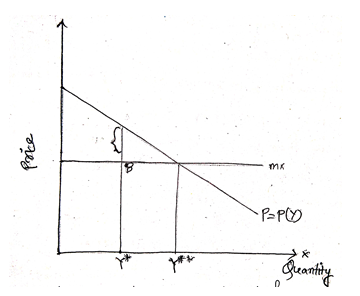Discuss optimum rate of depletion of non-renewable resource.
⇒Exhaustible resources will be depleted so long as the extraction rate is positive. The extraction behavior of an exhaustible resource such as oil differs from an ordinary good. An exhaustible resource is limited in quantity and it is not producible like an ordinary good.
Therefore the price taking firm for the extraction of an exhaustible resource takes into account the opportunity cost of extracting of a unit of resource. The sale or extraction of a unit today involves an opportunity cost. This cost is known as user cost (UC). The user cost doesn’t exist for reproducible goods. Since the consumption of an account doesn’t reduce the quantity that can be consumed in the future. However a barrel of oil extracted today is the barrel unavailable for extraction in the future in deciding whether to extract and sale additional barrel today, the extractor must consider not only the marginal cost of extraction (MC) per barrel, but also the cost of foregoing the highest return that could have been earned if the oil had instead been pumped and sold in the future. Hence there is inclusive definition of marginal cost which is called augmented marginal cost which is defined as the marginal cost of extraction (MC) plus the user cost (UC)
So, the optimum condition for a competitive resource owner (firm) to extract the resource in his period to the point when its amc equals the market price (P) i.e Market price P=mc+uc.
This is the first condition of optional depletion and the derivation of this equation can be shown as follows-
Where,
P1=Future price of a unit of resource
P0=Present price of a unit of resource
C=MC of extraction of a unit of resource (constant)
P1-C is the net profit of a unit of resource in future period : But the future value have to be discounted to express it in present period. Therefore P1-C/1+r is the present value of future net earning of a unit of resource.
P0-c is the present net profit of selling a unit of resource today
Now, if P0-c>P1-c/1+r then the extractor will extract the extra one unit of the resource and he will sell it today.
But, if P0-c < P1-c/1+r he will not decide to extract because the net earning in the future is more than the present net earning. So, the equilibrium will be achieved
when P0-C=P1-C/1+r
=>P0=C+P1-C/1+r
=mc+uc
The optimum extraction of an exhaustible resource can also be shown with the help of a diagram as follows→

Here AB is the user cost or opportunity cost of extracting a unit of resource today so the optimum extracting of the resource will be OY*
The second condition of optimum depletion rates that along the optimum extraction path, where the resource owner is indifference as to the options of extracting or living the resource in ground, the price of the resource not of marginal extraction cost i.e. the user cost has to rise at a rate equal to the discount rate i.e.
P0-1=P1-C/1+r
=>P1-C=(P0-C)×(1+r)
=>P1=(P0-C)×(1+r)+c
If we consider C is very small
So, P1=P0×(1+r)
This is the second condition of optimal depletion
Thus is the second condition of optimal depletion.
Thus in case of non-renewable resource the optimum condition for depletion are—
1. P=MC+C
2. P1=P0×(1+r)
| Article and Schedule Quiz | Start Test! |